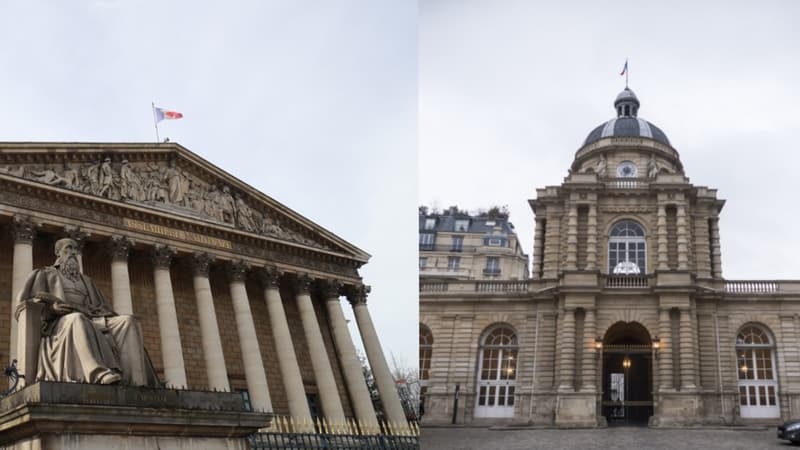It is therefore behind closed doors, far from the cameras and social networks, that seven deputies and seven senators meet this Wednesday, as part of a joint joint commission (CMP) that will decide on the future of the pension reform. This type of commission, provided for in article 45 of the Constitution, provides for bringing together parliamentarians in the event of disagreement between the two chambers, in order to reach a compromise.
Quite often crafted to defuse a deadlock between the Palais-Bourbon and the Palais du Luxembourg, these CMPs rarely attract attention, while two-thirds lead to an agreement, as the Senate website recalls. But sometimes, because the text under discussion crystallizes the tensions that move society, or because a deep disagreement divides deputies and senators, the veil of parliamentary sessions is lifted. We return in three dates on parliamentary commissions that have marked parliamentary life.
• 2010. Nicolas Sarkozy’s pension reform
In 2010, the government of Nicolas Sarkozy decided to undertake a major pension reform that, among a series of measures, sought to change the legal minimum retirement age from 60 to 62, citing the negative effects of the 2008 financial crisis as justification. on the French economy.
In first reading, the text is adopted on September 15 in the National Assembly, after seven days of debate. But it is in the Senate where things get difficult. Determined to defeat the law, the leftist senators decide to delay the debates. After three weeks of discussions, the government decided to use the blocked vote. Arrived at the public session on October 5, the text will be adopted by force by the upper house on October 22.
To lead to a common text, senators and deputies met in a joint commission on October 25, 2010. Dominated by the right and the center, in favor of the reform, the CMP managed to agree on a common text. In the minority in the negotiations, the left had nevertheless tried to push the government of Nicolas Sarkozy to negotiate with the social partners, while France was held back by large demonstrations and blockades at refineries and secondary schools.
Marisol Touraine, then a socialist senator, had then told AFP that the elected representatives of the left were going to present a single amendment for the government to enter “immediately into negotiations with the social partners.” Finally, the text resulting from the CMP will be definitively adopted by the Senate on October 26, by the National Assembly on October 27, and promulgated on November 9, 2010.
• 2020. Avia Hate Online Law
In 2019, LREM MP Laetitia Avia introduced a bill in the National Assembly “aimed at combating hate on the Internet”. Among the key measures in the text: the obligation for platforms to delete all hate content within 24 hours, under penalty of heavy fines, which can reach 1.25 million euros.
This measure immediately strained both Republicans and Socialists, who fear that, given the risks they are running, Facebook, Twitter or Instagram will practice censorship at all costs to avoid any persecution.
Despite these criticisms, the National Assembly approved the text on July 9, 2019. But in the Senate, dominated by the right, the bill was amputated from its flagship measure when it was adopted on December 17 of the same year, resulting in a joint commission convened on December 18. The latter ended in failure, senators and representatives could not agree.
As the Public Senate reports, Senator LR Christophe André Frassa at the time considered the text to be “unfinished and not constitutionally sound”. The health crisis obliges, the second reading of the text takes place a year later, in January 2020. It is the version of Laetitia Avia that is finally voted on by Parliament, with the National Assembly having primacy over the Senate in case of persistent disagreement between the two cameras.
But the real slap came from the Constitutional Council, which on June 18 had emptied the content of the law.
• 2022. The law that establishes the vaccination pass
Presented on December 27, 2021 by the government, the bill “strengthens the tools for managing the health crisis and modifies the public health code” aimed at transforming the health pass into a vaccination pass.
The text is adopted by the National Assembly on January 6, 2022, then by the Senate on January 12. But there are significant differences between the two cameras. On first reading, the senators want the pass to be lifted if the number of hospitalizations for Covid-19 falls below 10,000. They also oppose identity verification by restaurateurs.
A joint joint committee is convened on January 13, 2022. After four hours of discussions, the discussions are going in the right direction and MPs are close to reaching an agreement.
But while he is at a distance, Senator Les Républicains Bruno Retailleau tweets that the CMP “has agreed with the Senate on the passing of the vaccine, it is the victory of common sense. The senators have obtained many clarifications and simplifications.”
Result? The agreement between senators and deputies is annulled as the members of the majority consider that Bruno Retailleau has violated the principle of in camera mixed joint commissions by revealing the content of the debates on social networks. Bruno Retailleau had admitted that “certainly the tweet went too fast”, adding that he had “no regrets”. “He’s totally blown out of proportion.” Therefore, the National Assembly had finally had the last word on this text, promulgated on January 22, 2022.
Source: BFM TV


